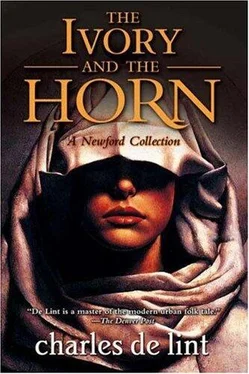Throughout Europe sacred wells were given new names after various saints. But as the centuries passed and religious beliefs changed, many of these saints' wells became less esteemed and pilgrims no longer approached them with the same feelings of devotion they once had. People stopped offering prayers to the saints and made a wish instead.
And the associated rituals often survived. In some places the wish-maker had to dip her bare hands into the water up to her wrists, make a silent wish, then withdraw her hands and swallow the water held in them. Other places, one left a pin, often bent, or the ever-popular coin. In some ways, wishing wells are a reversion to paganism, the serious wishes made at them being reminiscent of when people approached the sacred water to make an offering or benediction to some god or other, or to the spirit of the water.
Of course water wasn't seen just as the home of benevolent spirits. Folklore throughout the world relates the dangers of water witches and sirens, kelpies and other malevolent creatures whose sole existence seems to rely on drowning those they manage to snare with their various wiles. Everybody knows the story of how Ulysses confronted the sirens and most have probably heard of the Rhine maiden Lorelei— although, oddly enough, she entered folkloric tradition through Clemens Brentano's ballad "Lore Lay." He was so convincing that people just assumed it was based on true folklore.
Among the creepiest of the water witches are the Russian rusalki. They're lake spirits in female form— very beautiful and very deadly. They were supposed to bring a weird kind of ecstatic death when they drowned their victims, although some stories said it wasn't actually death they brought, but rather passage to another world. Another book I read said that before their current place in folklore tradition, they were considered to be fertility spirits. I found one reference where some Russian peasants were quoted as saying that "where the rusalki trod when dancing, there the grass grew thicker and the wheat more abundant."
That's the weird thing about folklore. Everything gets stirred up so you don't know which story's the original one anymore. Whatever comes along, be it a church or a new government, usually assimilates into their own the traditions and beliefs that existed before they came, and that's what creates the tangle.
This bit with the rusalki being psychopomps— leading human souls into the afterworld— makes them reminiscent of angels or Valkyries. Certain birds and animals could also act as "good shepherd" spirits. All of which might make the rusalki seem less scary, except I saw a representation of one in a book, and it gave me a serious case of the willies. The picture showed a tall, scowling woman dressed in a tattered green dress, with claw-like hands and burning eyes. In another book I ran across a painting of a Scottish waterwraith that could have been the rusalka's twin sister.
It's funny how the same inspirational source can make for opposite beliefs. Fertility goddess from one point of view, harbinger of death from another. Benevolent spirit or collector of souls. Weird.
Anyway, through all my reading, I never did discover anything interesting about the wishing well at the motel. It wasn't erected on some sacred site; it wasn't the central crossroad of a bunch of ley lines or the home of some Kickaha corn goddess. It was just a gimmick to get people to stop at the motel. But that makes for another funny thing— funny strange, still, not ha-ha. Jilly once told me that if you get enough people to agree that something is a certain way, then it becomes that way.
It almost makes sense. For one thing, it would explain how Elvis or JFK can be as much a spiritual avatar for some people as Jesus is for others. Or how a gimmicky wishing well could really grant wishes— just saying it did. Doesn't do much to explain the voices, though.
Or the ghosts.
Here's something I've never told anybody before: One day, about a month or so ago when I'm at the well, I get this weird compulsion to close my eyes and try to imagine the faces that once went with those long-lost voices I now hear.
All I want is for Timmy to look at me the way he looks at Jennifer.
That girl— was she pretty, or fat like me?
Please make Daddy stop shouting at Mommy the way he does.
That child— I can't tell, is it a boy or a girl?
We'll love each other forever.
Did they? They sound so young, that couple. Don't they know that nothing ever lasts? Nothing is forever. Except maybe loneliness. Or does being lonely just feel as though it lasts forever?
The air is thick with the scent of rose blossoms, the hum of bees. I look down at my legs and see them crisscrossed with the shadows of rose thorns and tiny jagged leaves. The faces rise easily in my imagination, but later I realize that maybe it wasn't such a good idea, calling them up the way I did.
Lying in bed that night, it's as though I've actually summoned their ghosts to me by imagining them. I dream about them, about their lives, about wishes that were granted and ones that weren't. About how the wishes some received weren't what they really wanted, how others are happy they never got theirs...
It all seems so real.
I learn to put them aside in the morning, but lately it's gotten harder. These last few days I can feel my life tangling with theirs. They're not dead people, I think, but then I realize some of them might be. The Wishing Well closed its doors twenty years ago. A lot can happen to a person in twenty years. I really could be living with their ghosts— if there really were such things.
Jilly believes in ghosts. As Wendy says, Jilly believes in all kinds of things that nobody else would. Not exactly tabloid fodder, but close. Everything's got a ghost, she says. A spirit. And if you look closely enough, if you pay attention and really learn to see, you'll be able to recognize it.
While Jilly can be persuasive, I don't think I can quite believe in ghosts. But I do believe in memories.
Jilly's friend Christy Riddell— the writer— made the connection between ghosts and memories for me. He told me it's not just people that have memories; places have them, too.
"If you think of ghosts as a kind of recording," he says, "a memory that's attached itself to a certain place or an object, then they don't become quite so farfetched after all."
"So why don't we see them everywhere?" I ask. "Why doesn't everyone see them?"
"People's minds are like radio receivers," he explains. "They're not all capable of tuning into every station."
I still don't believe in ghosts and I tell him so.
"Look at the stars," he says.
This is happening in the middle of a party at Wendy's house. Christy and I are having a smoke in the backyard, thrown together because we're the only ones with the habit in Wendy's circle of friends.
"What about them?" I ask, my gaze roving from star to star in the darkness overhead.
"Did you ever think about how many of them are ghosts?"
"I don't get it."
"We're not seeing the stars as they are right now," he says. "We're seeing them as they were thousands of years ago, maybe millions of years ago— however long it took their light to reach us. Some of them don't exist anymore. What we see when we look at them right now aren't the stars themselves, but the light that they gave off— images of themselves, of what they once were."
"So...?"
"So maybe that's what ghosts are."
I hate to admit it, but I can almost buy this.
"Then how come ghosts are so scary?" I ask.
"They're not always," he says. "But memories can be like wounds. They're not easily forgotten because they leave a scar as a constant reminder. It's the moments of strongest emotions that we remember the most: a love lost or won; anger, betrayal, vengeance. I think it's the same for ghosts, the strength of their emotions at the time of their death is what allows them to linger, or go on."
Читать дальше












